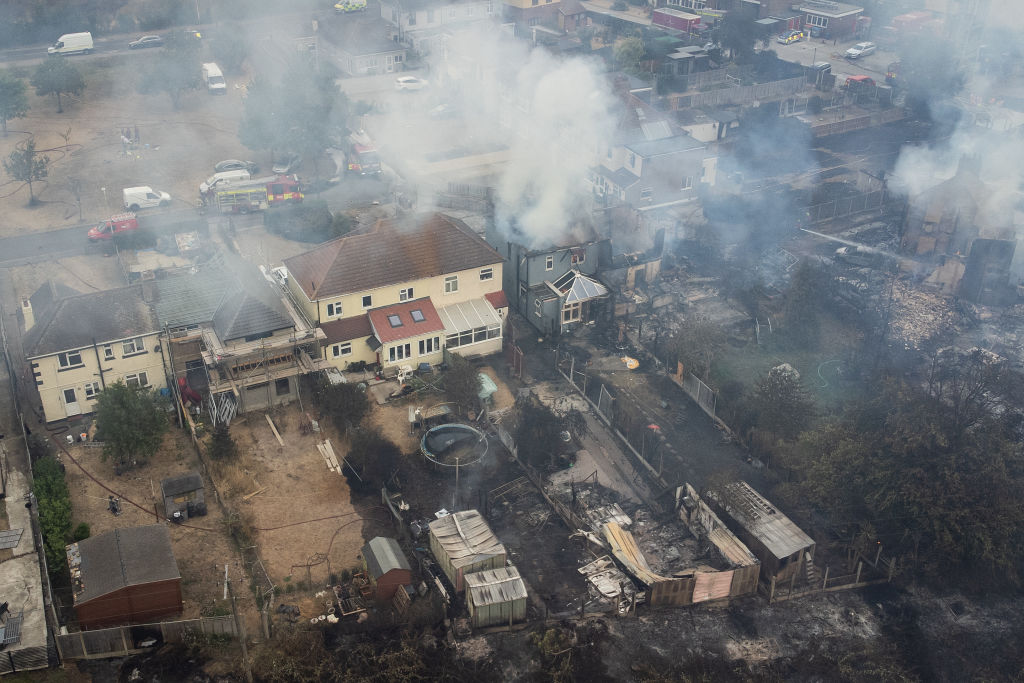“Calm down, it’s just a sunny day.” That was the refrain from a small but powerful section of the British establishment this week, as temperatures in the U.K.—where summer highs rarely reach 30°C (86°F)—topped 40°C (104°F) for the first time in recorded history. Deputy Prime Minister Dominic Raab, of the ruling Conservative party, told the public to relax and “enjoy the sunshine.” Conservative lawmaker John Hayes called people who worried about the heat “cowardly.” Rightwing newspaper the Daily Mail bemoaned the “Sunny day Snowflake Britain had a meltdown.” Another tabloid, the Daily Express, offered a cheery spin on the U.K.’s famous wartime slogan: “It’s not the end of the world: just stay cool and carry on.”
The Blitz spirit couldn’t stop runways from melting at U.K. airports this week, though, or help London firefighters put out blazes that raged across overheated buildings, or give school kids enough energy to learn. For most people, sweltering in homes designed for a different climate, the heat was oppressive and disruptive, if not terrifying.
The disconnect between the rosy picture rightwing politicians and columnists painted of the heat, and what it felt like to step outside, recalls the way climate change impacts have long been politicized in the U.S., with two polarized sides seeing different things when they look out the window. Like the original, the imported culture war is financed by fossil fuel money: Hayes receives a £50,000-a-year salary (nearly $60,000) from an oil company; the Daily Mail ran a full page op-ed arguing against meteorologists’ “doom-laden” heat warnings, written by an energy company consultant.

And like the mainstream U.S. right, U.K. conservatives have moved beyond questioning the existence of climate change, to disputing the need for action. An editorial for the Telegraph newspaper claimed that the U.K.’s heatwave is a sign that efforts to stop global warming have failed, and are too expensive, so we should focus on adapting to it instead. (Neither British people, let alone the billions of people who live in more climate-vulnerable countries, can adapt to the level of climate breakdown that will take place if we don’t rapidly cut greenhouse gas emissions.)
The authors of such editorials may be a minority. But they currently hold a huge sway over the future of the U.K. government. Following the resignation of Prime Minister Boris Johnson earlier this month, the Conservative Party is in the middle of a leadership contest. The winner will be the next Prime Minister. The two contenders left in the race have “generally” or “almost always” voted against measures to respond to climate change, according to a parliamentary data watchdog. They will now seek endorsements from rightwing media outlets who are sceptical of the U.K.’s 2050 net-zero target, and frame fossil fuel investment as the answer to the energy price crisis.
In the climate conversation taking place between rightwing commentators and politicians, the interests of the vast majority of people who live in the U.K. are excluded. Those trying to turn climate action into a culture war claim they’re fighting against the tyranny of progressive dogma, for greater flexibility in how we address our environmental challenges. But that definition of freedom doesn’t make sense for most of us, argues Tom Burke, a veteran U.K. government adviser and co-founder of climate think tank E3G. “There’s a whole group of the public who are really interested in freedom from all the things that will disrupt our lives if we don’t deal with climate change. They are in battle with a [smaller] group of people who want the freedom to burn all the fossil fuels they want.”
The U.S. shows what happens when a national climate change debate becomes divorced from how the public actually experiences climate impacts: thanks to the opposition of the entire Republican party and one fossil fuel-sponsored Democrat, Congress has failed to pass meaningful climate legislation, even as polls show a strong majority in favor of greater action to address the problem.
The good news is, you can’t gaslight people out of feeling extreme temperatures—no matter how many times you call them a snowflake. The bad news is, we need to work a lot harder to make those in power feel the heat.
More Must-Reads From TIME
- The 100 Most Influential People of 2024
- The Revolution of Yulia Navalnaya
- 6 Compliments That Land Every Time
- What's the Deal With the Bitcoin Halving?
- If You're Dating Right Now , You're Brave: Column
- The AI That Could Heal a Divided Internet
- Fallout Is a Brilliant Model for the Future of Video Game Adaptations
- Want Weekly Recs on What to Watch, Read, and More? Sign Up for Worth Your Time
Write to Ciara Nugent at ciara.nugent@time.com